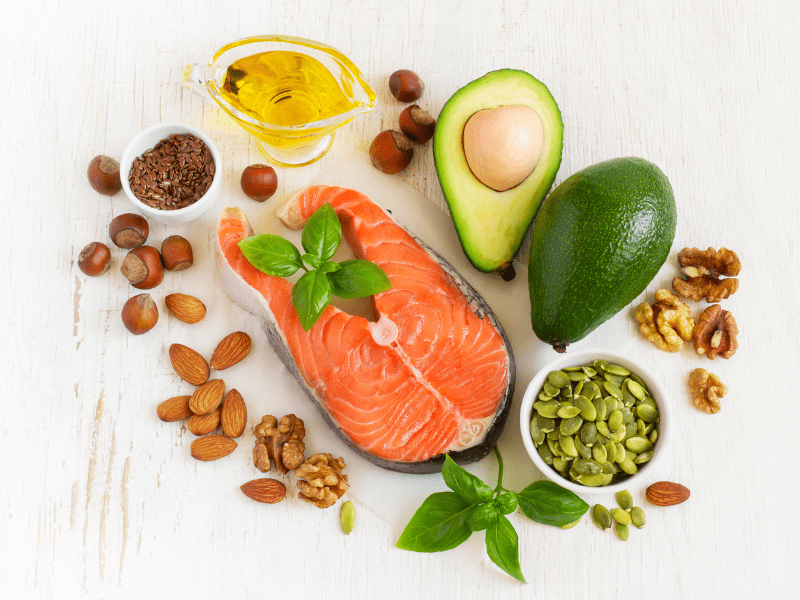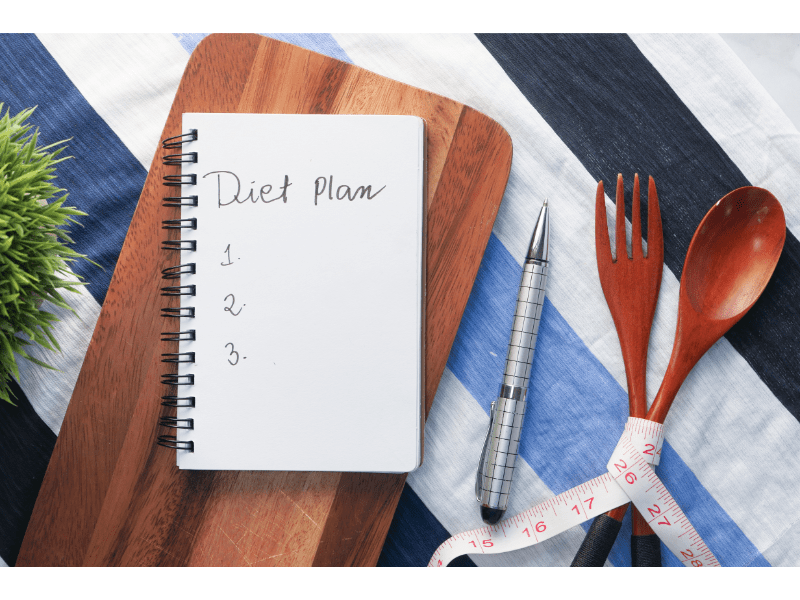Understanding the Importance of a Well-Designed Diet Plan for Weight Loss
When it comes to achieving weight loss goals, many people often focus solely on exercise routines and overlook the crucial role that diet plays in their journey. A well-designed diet plan tailored to your specific needs can significantly contribute to successful weight loss.
A diet plan for weight loss involves carefully selecting and balancing the types and quantities of food you consume. It takes into account factors such as your current weight, body composition, activity level, and overall health goals. By following a structured diet plan, you can create a calorie deficit that promotes fat burning while ensuring you still receive essential nutrients.
The importance of a well-designed diet plan cannot be overstated. It provides structure and guidance, helping you make informed choices about what foods to eat and in what quantities. A balanced diet plan ensures that you consume all the necessary macronutrients (carbohydrates, proteins, and fats) as well as micronutrients (vitamins and minerals) required for optimal health.
Moreover, a well-designed weight loss diet helps regulate blood sugar levels, control cravings, improve digestion, boost energy levels, and enhance overall well-being. It is not just about restricting calories but also about making healthier food choices that nourish your body while promoting sustainable weight loss.
In this section on understanding the importance of a well-designed diet plan for weight loss, we will explore various aspects of creating an effective dietary strategy. We will delve into the benefits of following a structured eating plan tailored specifically for weight loss purposes. Additionally, we will discuss key considerations when designing a personalized diet chart for weight loss that aligns with your individual needs and preferences.
By gaining insight into the significance of nutrition in achieving your desired physique or shedding excess pounds effectively and sustainably through proper dietary planning, you can take charge of your weight loss journey with confidence. Let’s dive in.
Table of Contents
20 Strategies Diet Plan for Weight Loss in 2024
Determine Your Weight Loss Goals and Timeline
When embarking on a weight loss journey, it is essential to set clear and realistic goals. By determining your weight loss goals and timeline, you can establish a roadmap for success and stay motivated throughout the process.
Setting weight loss goals allows you to have a specific target in mind. This not only helps you stay focused but also provides a sense of accomplishment as you progress towards your desired weight. It is important to set goals that are realistic and attainable, taking into consideration factors such as your current weight, body composition, and overall health.
In addition to setting goals, establishing a timeline for your weight loss journey can provide structure and accountability. Having a timeframe in mind can help you track your progress and make necessary adjustments along the way. However, it is crucial to remember that healthy weight loss is gradual and sustainable. Rapid or extreme weight loss can be detrimental to your health and may not be maintainable in the long run.
By determining your weight loss goals and timeline, you can approach your journey with clarity and purpose. Remember to consult with healthcare professionals or registered dietitians who can provide personalized guidance based on your individual needs and circumstances.
Calculate Your Daily Caloric Intake Requirement
Calculating your daily caloric intake requirement is an essential step in maintaining a healthy and balanced diet. By understanding how many calories your body needs, you can make informed decisions about your food choices and portion sizes.
To determine your caloric intake requirement, one method involves calculating your Basal Metabolic Rate (BMR). BMR is the number of calories your body needs to maintain basic bodily functions at rest. Factors such as age, gender, weight, and height are taken into account during this calculation.
Once you have determined your BMR, you can then factor in your activity level to estimate the total number of calories you should consume each day. This takes into consideration the calories burned through physical activity and exercise.
Calorie counting plays a crucial role in managing weight loss or gain goals. By tracking the number of calories consumed versus burned, individuals can create a calorie deficit or surplus to achieve their desired outcomes.
It is important to note that these calculations provide an estimate and individual variations may exist. Consulting with a healthcare professional or registered dietitian can offer personalized guidance based on specific needs and goals.
Include a Variety of Nutrient-Dense Foods in Your Diet Chart

In order to maintain a healthy and balanced diet, it is important to include a variety of nutrient-dense foods in your daily meal plan. These nourishing foods not only provide essential vitamins and minerals, but they can also support weight loss goals.
When creating a diet chart, it is crucial to focus on incorporating nutrient-dense foods that are low in calories but high in nutritional value. This can help ensure that you are getting the necessary nutrients without consuming excessive amounts of calories.
Some examples of nutrient-dense foods that can be included in your diet chart are fruits and vegetables, lean proteins such as chicken and fish, whole grains like quinoa and brown rice, and healthy fats from sources like avocados and nuts.
By including these nourishing foods in your diet chart, you can create a well-rounded and balanced meal plan that supports weight loss while providing the essential nutrients your body needs to function optimally. Remember to consult with a healthcare professional or registered dietitian for personalized advice tailored to your specific dietary needs.
Prioritize Protein Intake to Support Muscle Growth and Satiety
When it comes to achieving muscle growth and maintaining satiety, prioritizing protein intake in your diet plan is crucial. Protein-rich foods play a significant role in supporting muscle growth, as well as aiding in weight loss and promoting feelings of fullness.
Including an adequate amount of protein in your diet can help repair and build muscles after exercise. This is because proteins are made up of amino acids, which are the building blocks of muscle tissue. By consuming protein-rich foods, you provide your body with the necessary nutrients to support muscle recovery and growth.
Moreover, protein has a higher thermic effect compared to carbohydrates and fats. This means that it requires more energy for digestion and absorption, leading to increased calorie expenditure. As a result, incorporating protein into your meals can aid in weight loss efforts by boosting metabolism and promoting fat burning.
In addition to its role in muscle growth and weight management, protein also plays a key role in promoting satiety. High-protein meals have been found to increase feelings of fullness and reduce hunger cravings compared to meals that are low in protein. By including adequate amounts of protein throughout the day, you can help control your appetite and prevent overeating.
To prioritize protein intake for optimal muscle growth and satiety, consider incorporating lean sources of protein such as chicken breast, fish, tofu, eggs, Greek yogurt, legumes, and nuts into your meals. Aim for a balanced distribution of protein throughout the day to ensure consistent nutrient supply for muscle repair and maintenance.
Remember that individual dietary needs may vary based on factors such as age, gender, activity level, and overall health goals. It is always advisable to consult with a healthcare professional or registered dietitian when making significant changes to your diet plan or if you have specific nutritional requirements.
Incorporate Healthy Fats into Your Diet Chart

Incorporating healthy fats into your diet is essential for maintaining overall health and supporting weight loss goals. Contrary to popular belief, not all fats are bad for you. In fact, certain types of fats can provide numerous health benefits when consumed in moderation.
When it comes to weight loss, it’s important to focus on incorporating sources of healthy fats into your diet. These types of fats can help you feel fuller for longer, reduce cravings, and support a healthy metabolism. Here are some key sources of healthy fats that you can include in your diet plan:
- Avocados: Avocados are not only delicious but also packed with heart-healthy monounsaturated fats. They can be enjoyed sliced on toast, added to salads or smoothies, or used as a substitute for butter or mayonnaise.
- Nuts and Seeds: Almonds, walnuts, chia seeds, flaxseeds, and hemp seeds are excellent sources of healthy fats. They can be sprinkled over salads or yogurt, added to smoothies or oatmeal, or simply enjoyed as a snack.
- Olive Oil: Olive oil is rich in monounsaturated fats and is a staple in Mediterranean cuisine. It can be used for cooking or drizzled over salads as a dressing.
- Fatty Fish: Salmon, mackerel, sardines, and trout are examples of fatty fish that are high in omega-3 fatty acids – a type of polyunsaturated fat known for its anti-inflammatory properties and potential benefits for heart health.
- Coconut Oil: While coconut oil is high in saturated fat content compared to other plant-based oils, it has been shown to have potential health benefits when consumed in moderation. It can be used in cooking or baking as an alternative to other oils.
Remember that while incorporating these healthy fat sources into your diet plan is beneficial for weight loss and overall health, portion control is still important. Aim for moderation and balance in your diet, and consult with a healthcare professional or registered dietitian for personalized advice.
Choose Complex Carbohydrates over Simple Sugars
When it comes to managing weight and promoting overall health, understanding the difference between complex carbohydrates and simple sugars is crucial. In this section, we will explore the impact of dietary carbohydrates on weight loss and why choosing complex carbs over simple sugars is beneficial.
Complex carbohydrates are found in foods such as whole grains, legumes, fruits, and vegetables. They are composed of longer chains of sugar molecules that take longer to digest. This slow digestion process leads to a gradual release of glucose into the bloodstream, providing a steady and sustained source of energy.
On the other hand, simple sugars are found in processed foods, sugary beverages, candies, and desserts. These sugars are quickly digested by the body and cause a rapid spike in blood sugar levels. This sudden surge in energy is often followed by a crash, leaving you feeling tired and craving for more sugary foods.
Choosing complex carbohydrates over simple sugars offers several advantages when it comes to weight management. Firstly, complex carbs provide a greater sense of satiety due to their higher fiber content. This helps control hunger cravings and prevents overeating.
Additionally, complex carbohydrates have a lower glycemic index compared to simple sugars. The glycemic index measures how quickly a carbohydrate-containing food raises blood sugar levels. Foods with lower glycemic index values have less impact on blood sugar levels and can help regulate insulin response.
Incorporating complex carbohydrates into your diet chart can also provide essential nutrients such as vitamins, minerals, antioxidants, and dietary fiber that support overall health.
To make healthier choices regarding dietary carbohydrates for weight loss purposes or general well-being:
- Opt for whole grain products like brown rice or whole wheat bread instead of refined grains.
- Include plenty of fruits and vegetables in your meals.
- Choose legumes such as lentils or beans as an excellent source of protein along with complex carbs.
- Minimize consumption of sugary snacks or drinks high in added sugars.
By prioritizing complex carbohydrates over simple sugars in your diet, you can support weight loss efforts, maintain steady energy levels, and improve overall health.
Increase Fiber Intake to Promote Satiety and Digestive Health
Increasing fiber intake is a key strategy for promoting satiety and digestive health. Fiber-rich foods not only aid in weight loss but also offer numerous benefits to overall health.
When it comes to weight loss, incorporating fiber-rich foods into a diet plan can be highly beneficial. High-fiber foods tend to be more filling, helping to curb hunger and reduce calorie intake. This can contribute to weight management by promoting a feeling of fullness and reducing the likelihood of overeating.
Additionally, fiber plays a crucial role in maintaining digestive health. It aids in proper digestion by adding bulk to the stool, preventing constipation, and promoting regular bowel movements. This can help alleviate common digestive issues such as bloating and discomfort.
Furthermore, a diet rich in fiber has been associated with a reduced risk of various chronic diseases. Studies have shown that high-fiber diets may lower the risk of heart disease, type 2 diabetes, and certain types of cancer.
To increase fiber intake, it is recommended to incorporate a variety of fiber-rich foods into your diet plan. Some excellent sources include fruits such as berries and apples, vegetables like broccoli and Brussels sprouts, whole grains such as oats and quinoa, legumes like lentils and beans, as well as nuts and seeds.
Increasing fiber intake through consuming fiber-rich foods is an effective strategy for promoting satiety during weight loss efforts while also supporting optimal digestive health. Incorporating these nutrient-dense options into your diet plan can provide numerous benefits for overall well-being.
Limit Added Sugars and Processed Foods
Limiting added sugars and processed foods is crucial for maintaining a healthy diet and achieving weight loss goals. The consumption of added sugars has been linked to weight gain and various health issues such as obesity, type 2 diabetes, and heart disease.
Added sugars, which are sugars that are not naturally present in foods, can be found in a wide range of products including sodas, candies, baked goods, and even seemingly “healthy” items like flavored yogurts or granola bars. These sugars provide empty calories without any nutritional value.

When it comes to weight loss, reducing the intake of added sugars is essential. They contribute to increased calorie intake without providing satiety or essential nutrients. By cutting back on added sugar consumption, individuals can lower their overall calorie intake and promote weight loss.
In addition to limiting added sugars, it is important to avoid processed foods in a diet plan. Processed foods often contain high levels of sodium, unhealthy fats, artificial additives, and preservatives. These ingredients not only have negative effects on our health but also tend to be calorie-dense while lacking in essential nutrients.
By opting for whole foods such as fruits, vegetables, lean proteins, whole grains, and legumes instead of processed options like packaged snacks or fast food meals – individuals can improve their overall nutrition intake while reducing the consumption of unhealthy additives.
Overall, making a conscious effort to limit added sugars and avoid processed foods can significantly contribute to a healthier diet plan and support weight loss goals. It is important to read food labels carefully and choose whole food options whenever possible in order to prioritize nutrition over empty calories.
Control Portion Sizes to Manage Caloric Intake
Portion control is a key aspect of managing caloric intake and achieving weight loss goals. By controlling the sizes of the portions we consume, we can effectively manage our calorie intake and promote a healthier lifestyle.
When it comes to weight loss, it’s not just about what we eat, but how much we eat. Portion control involves being mindful of the amount of food we consume in each meal or snack. This practice helps us avoid overeating and ensures that we are consuming an appropriate number of calories for our individual needs.
One effective way to implement portion control is by using a diet chart or meal plan. These charts provide guidance on recommended serving sizes for different food groups, making it easier to manage caloric intake. By following these guidelines, individuals can ensure that they are consuming balanced meals with appropriate portion sizes.
Portion control also allows for flexibility in food choices. It doesn’t necessarily mean restricting certain foods entirely but rather moderating their consumption. By being aware of portion sizes, individuals can still enjoy their favorite foods while maintaining a healthy balance in their overall diet.
Controlling portion sizes plays a crucial role in managing caloric intake and achieving weight loss goals. Incorporating portion control into a diet chart or meal plan can help individuals make informed choices about their food consumption and promote a healthier lifestyle overall.
Include Regular Physical Activity in Your Weight Loss Plan
Regular physical activity plays a crucial role in any weight loss plan. Exercise not only helps burn calories but also improves overall health and well-being. When it comes to incorporating physical activity into a diet plan, there are several key considerations to keep in mind.
Firstly, it’s important to choose exercises that you enjoy and that suit your fitness level. This will increase the likelihood of sticking with the routine long-term. Whether it’s jogging, swimming, cycling, or dancing, finding an activity that you find enjoyable can make all the difference.
Secondly, aim for a combination of cardiovascular exercises and strength training. Cardiovascular exercises such as brisk walking or running help elevate your heart rate and burn calories. Strength training exercises like weightlifting or bodyweight exercises help build lean muscle mass, which can boost your metabolism and aid in weight loss.
Additionally, try to incorporate physical activity into your daily routine whenever possible. This could mean taking the stairs instead of the elevator, parking further away from your destination to get some extra steps in, or even doing household chores with more vigor.
Remember to start slowly and gradually increase both the duration and intensity of your workouts over time. It’s also important to listen to your body and rest when needed to prevent injury.
Including regular physical activity in your weight loss plan is essential for achieving long-term success. By choosing activities you enjoy, incorporating both cardiovascular exercise and strength training, and finding ways to be active throughout the day, you can create a sustainable routine that supports your weight loss goals.
Stay Hydrated and Opt for Low-Calorie Beverages
Staying hydrated is crucial for overall health and plays a significant role in weight loss. When it comes to weight loss, many people focus solely on diet and exercise, overlooking the importance of proper hydration. In this section, we will explore the significance of hydration in weight loss and discuss the benefits of opting for low-calorie beverages as part of a balanced diet.
Hydration is essential for maintaining optimal bodily functions and can significantly impact weight loss efforts. Drinking an adequate amount of water helps boost metabolism, suppresses appetite, and aids in digestion. It also helps regulate body temperature and supports the elimination of waste products from the body.

When it comes to choosing beverages while on a weight loss journey, opting for low-calorie options can make a significant difference. High-calorie drinks such as sugary sodas, fruit juices, or alcoholic beverages can contribute to excess calorie intake without providing much nutritional value. On the other hand, low-calorie beverages like infused water, unsweetened tea or coffee, herbal teas, and sparkling water can be refreshing alternatives that hydrate without adding unnecessary calories to your diet.
Incorporating low-calorie beverage choices into your daily routine can help you stay hydrated while supporting your weight loss goals. These options not only provide hydration but also offer various health benefits depending on their ingredients. By making mindful choices when it comes to what you drink throughout the day, you can support your overall well-being while working towards achieving your desired weight.
In the following sections, we will delve deeper into specific low-calorie beverage options that are not only hydrating but also offer additional health benefits when incorporated into a well-balanced diet plan.
Plan Your Meals and Snacks Ahead of Time
Meal planning is a crucial aspect of any successful weight loss journey. By taking the time to plan your meals and snacks ahead of time, you can ensure that you are making healthy choices and staying on track with your goals.
When it comes to meal planning for weight loss, it’s important to focus on nutrient-dense foods that will keep you feeling satisfied and energized throughout the day. Include a variety of fruits, vegetables, lean proteins, whole grains, and healthy fats in your meal plan.
In addition to planning your main meals, don’t forget about snacks. Snacking can often derail weight loss efforts if not done mindfully. However, including well-chosen snacks in your diet plan can actually help curb cravings and prevent overeating during meals.
When selecting snack options for your well-designed diet plan, opt for nutritious choices such as fresh fruits and vegetables, Greek yogurt with berries, nuts and seeds, or hummus with whole grain crackers. These snacks provide a balance of macronutrients and are packed with vitamins, minerals, and fiber.
By planning your meals and snacks ahead of time, you can take control of your nutrition and make healthier choices that align with your weight loss goals. This practice also helps save time during busy weekdays by ensuring you have all the necessary ingredients on hand.
Listen to Your Body’s Hunger and Fullness Cues
Maintaining mindful eating habits is essential for overall health and well-being. One important aspect of mindful eating is listening to your body’s hunger and fullness cues during meals. By recognizing these signals, you can better regulate your food intake and make healthier choices.
Hunger cues are the body’s way of signaling that it needs nourishment. These cues can manifest as a growling stomach, feelings of emptiness or low energy levels. It is important to pay attention to these signals and honor them by providing your body with the nutrients it needs.
On the other hand, recognizing fullness cues is equally important. These cues indicate that your body has received enough food and is satisfied. They can include feelings of satisfaction, a decrease in appetite or a sense of fullness in the stomach.
By being aware of these hunger and fullness signals, you can avoid overeating or undereating, which can have negative effects on your health. Mindful eating allows you to eat in response to physical hunger rather than emotional triggers or external influences.
Practicing mindful eating involves slowing down during meals, paying attention to the taste and texture of food, and checking in with your body throughout the meal. It may take time to develop this skill, but with practice, you can become more attuned to your body’s cues and make choices that support your overall well-being.
Seek Support from a Registered Dietitian or Nutritionist
When it comes to weight loss and personalized diet plans, seeking support from a registered dietitian or nutritionist can be incredibly beneficial. These professionals have the knowledge and expertise to guide individuals on their weight loss journey in a safe and effective manner.
Registered dietitians and nutritionists can provide personalized advice tailored to an individual’s specific needs, taking into consideration factors such as medical history, dietary preferences, lifestyle, and goals. By consulting with an expert in this field, individuals can receive guidance on creating a balanced meal plan that promotes weight loss while ensuring proper nutrition.
One of the key advantages of working with a registered dietitian or nutritionist is the ability to receive ongoing support and accountability. These professionals can monitor progress, make necessary adjustments to the diet plan, and provide motivation throughout the weight loss process.
Furthermore, seeking support from a registered dietitian or nutritionist ensures that individuals are receiving evidence-based information. With so much misinformation available online regarding diets and weight loss strategies, consulting with an expert helps separate fact from fiction.
When aiming for successful weight loss and personalized diet plans, seeking support from a registered dietitian or nutritionist is highly recommended. Their expertise can provide invaluable guidance, accountability, and evidence-based information for achieving long-term success in reaching health goals.
Make Gradual Changes to Avoid Overwhelming Yourself
When it comes to making sustainable changes in a weight loss diet plan, it’s important to avoid overwhelming yourself. Instead of diving headfirst into a complete overhaul of your eating habits, taking a gradual approach can lead to long-term success.
Making small, incremental changes allows your body and mind to adjust at a comfortable pace. This not only makes the transition easier but also increases the likelihood of sticking with the new dietary habits.
Start by identifying one or two areas where you can make healthier choices. This could be swapping sugary drinks for water or incorporating more fruits and vegetables into your meals. Once you feel comfortable with these changes, gradually introduce additional modifications.
By making gradual changes, you give yourself time to adapt and establish new routines. It’s important to remember that sustainable weight loss is not about quick fixes or extreme measures but rather about creating lasting habits that support a healthy lifestyle.
Taking this approach also helps prevent feelings of deprivation or restriction often associated with drastic dieting. Instead, you can focus on nourishing your body and enjoying the process of discovering new foods and flavors.
Remember, progress is progress no matter how small. By implementing gradual changes in your weight loss diet plan, you set yourself up for long-term success and improved overall well-being.
Keep Track of Your Progress with Food Journals or Mobile Apps
When it comes to weight loss and maintaining a healthy diet, tracking your progress is crucial. One effective way to do this is by using food journals or mobile apps specifically designed for diet tracking.
Diet tracking tools for weight loss have become increasingly popular in recent years, as they provide a convenient and efficient way to monitor your food intake and make informed decisions about your diet. These tools allow you to log what you eat and drink throughout the day, providing valuable insights into your eating habits.
Food journals or mobile apps offer several benefits when it comes to monitoring progress. Firstly, they help create awareness about portion sizes and the nutritional content of the foods you consume. By logging everything you eat, you can identify patterns or areas where adjustments need to be made.

Additionally, these tools often come equipped with features such as calorie counters, nutrient trackers, and meal planners. This allows you to set goals based on your specific dietary needs and track your progress towards achieving them.
Moreover, many of these apps also provide community support through forums or social networks where users can share their experiences, seek advice from others on similar journeys, and find motivation to stay committed.
Utilizing food journals or mobile apps for diet tracking offers an effective way to keep track of your progress in terms of weight loss or maintaining a healthy lifestyle. These tools provide valuable insights into your eating habits while offering features that can help set goals and stay motivated on your journey towards better health.
Be Mindful of Emotional Eating Triggers and Find Healthy Coping Mechanisms
When embarking on a weight loss journey, it is important to be mindful of emotional eating triggers and find healthy coping mechanisms. Emotional eating refers to the act of turning to food for comfort or as a way to cope with negative emotions.
Managing emotional eating during weight loss requires awareness and self-reflection. It is essential to identify the triggers that lead to emotional eating. These triggers can vary from person to person and may include stress, boredom, loneliness, or even certain environments or social situations.
Once the triggers are recognized, it becomes easier to find alternative ways to cope with emotions. Instead of reaching for unhealthy snacks, individuals can explore healthier coping mechanisms such as engaging in physical activity, practicing mindfulness or meditation, journaling their thoughts and feelings, seeking support from loved ones or professionals, or indulging in hobbies that bring joy and relaxation.
By being mindful of emotional eating triggers and finding healthy coping mechanisms, individuals can better manage their emotions without resorting to food. This not only supports weight loss efforts but also promotes overall well-being and a healthier relationship with food.
Get Adequate Sleep to Support Weight Loss Efforts
Getting adequate sleep is not only crucial for overall health and well-being, but it also plays a significant role in supporting weight loss efforts. Many people overlook the importance of quality sleep when it comes to their diet plan, but research has shown that lack of sleep can hinder weight loss progress.
Sleep deprivation can disrupt the balance of hormones that regulate hunger and fullness, such as ghrelin and leptin. When you don’t get enough sleep, ghrelin levels increase, which stimulates appetite and cravings for high-calorie foods. On the other hand, leptin levels decrease, leading to reduced feelings of fullness and satisfaction after meals.
Moreover, inadequate sleep can affect your metabolism. It slows down your body’s ability to burn calories efficiently and can lead to insulin resistance, making it harder for your body to regulate blood sugar levels effectively.
Incorporating sufficient sleep into your weight loss journey is essential for several reasons. Firstly, it helps you maintain better control over your food choices by reducing cravings for unhealthy snacks or comfort foods. Secondly, quality sleep promotes optimal hormone balance related to appetite regulation. Lastly, it supports a healthy metabolism by allowing your body to function optimally during the day.
To ensure adequate sleep for weight loss support, establish a consistent bedtime routine and aim for seven to nine hours of uninterrupted rest each night. Create a comfortable sleeping environment free from distractions like electronic devices or excessive noise. Additionally, practicing relaxation techniques before bed can help promote better quality sleep.
By prioritizing quality sleep as part of your diet plan and overall wellness routine, you are setting yourself up for success on your weight loss journey. Remember that achieving sustainable weight loss involves various factors including nutrition, exercise, stress management – and yes – adequate restful slumber.
Stay Consistent and Patient with Your Weight Loss Journey
When it comes to embarking on a weight loss journey, it’s important to remember two key factors: consistency and patience. These are the pillars that will help you achieve your goals in a sustainable and healthy manner.
Maintaining consistency in your diet plan is crucial for long-term success. This means sticking to your chosen eating plan, whether it’s counting calories, following a specific diet, or practicing portion control. Consistency allows your body to adapt and respond to the changes you are making, leading to gradual and sustainable weight loss.
However, it’s equally important to remain patient throughout the process. Weight loss is not an overnight transformation; it takes time for your body to adjust and for results to become visible. It’s common for progress to be slow at times or even plateau temporarily. Patience is key during these moments as they are often part of the natural weight loss journey.
Remember that everyone’s weight loss journey is unique, and comparisons with others can be counterproductive. Stay focused on your own progress and celebrate each milestone along the way. By staying consistent with your diet plan and remaining patient throughout the process, you will increase your chances of achieving long-lasting results in a healthy manner.
Celebrate Milestones and Non-Scale Victories to Stay Motivated
Celebrating milestones and non-scale victories can be a powerful way to stay motivated on your weight loss journey. While the number on the scale is often the primary focus, it’s important to recognize and reward progress beyond just weight loss.
Non-scale victories refer to achievements that are not directly related to the number on the scale. These can include things like fitting into a smaller clothing size, having more energy throughout the day, or noticing improvements in strength and endurance during workouts.
By acknowledging and celebrating these non-scale victories, you can boost your motivation and reinforce positive behaviors. It’s important to remember that weight loss is not solely determined by the number on the scale, but also by overall health and well-being.

One way to celebrate milestones and non-scale victories is by setting specific goals for yourself along your weight loss journey. These goals can be both short-term (such as completing a certain number of workouts in a week) and long-term (such as reaching a certain body fat percentage). When you achieve these goals, take time to acknowledge your success and reward yourself in a meaningful way.
Additionally, keeping track of your progress through journaling or using a tracking app can help you see how far you’ve come. This visual representation of your accomplishments can serve as a reminder of what you’ve achieved and provide motivation to keep pushing forward.
Remember that celebrating milestones and non-scale victories is not about indulging in unhealthy behaviors or rewards that may hinder your progress. Instead, focus on treating yourself with kindness and finding ways to celebrate that align with your health goals.
By incorporating celebrations for both milestones and non-scale victories into your weight loss journey, you’ll create a positive mindset shift that will keep you motivated for long-term success.
Implement these Strategies for Long-Term Weight Loss Success
In conclusion, achieving long-term weight loss success requires a combination of strategies that address both physical and mental aspects. By incorporating these strategies into your lifestyle, you can create sustainable habits that will support your weight loss journey.
Firstly, adopting a balanced and nutritious diet is essential. Focus on consuming whole foods, including plenty of fruits, vegetables, lean proteins, and whole grains. Avoid processed and sugary foods as much as possible. Additionally, portion control plays a crucial role in managing calorie intake.
Regular physical activity is another key component of successful weight loss. Aim for at least 150 minutes of moderate-intensity exercise per week. This can include activities such as brisk walking, cycling, swimming or engaging in sports you enjoy. Incorporating strength training exercises will also help build lean muscle mass and boost metabolism.
Managing stress levels is often overlooked but crucial for long-term weight loss success. High levels of stress can lead to emotional eating and hinder progress. Find healthy ways to cope with stress such as practicing mindfulness techniques or engaging in hobbies that bring you joy.
Setting realistic goals and tracking progress are important for staying motivated and accountable. Celebrate small victories along the way to keep yourself motivated on your weight loss journey.
Lastly, seeking support from friends, family or joining a community of individuals with similar goals can provide invaluable encouragement and accountability.
By implementing these strategies consistently over time, you can achieve long-term weight loss success while maintaining a healthy lifestyle for years to come.


4 thoughts on “20 Strategies for Diet Plan for Weight Loss in 2024”